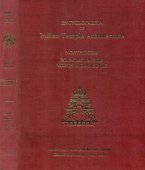Karas: 5 definitions
Introduction:
Karas means something in Hinduism, Sanskrit, biology. If you want to know the exact meaning, history, etymology or English translation of this term then check out the descriptions on this page. Add your comment or reference to a book if you want to contribute to this summary article.
Biology (plants and animals)
Source: Google Books: CRC World Dictionary (Regional names)1) Karas in India is the name of a plant defined with Lathyrus sativus in various botanical sources. This page contains potential references in Ayurveda, modern medicine, and other folk traditions or local practices It has the synonym Lathyrus sativus L. subsp. asiaticus Zalkind (among others).
2) Karas is also identified with Cicer arietinum It has the synonym Ononis crotalarioides Coss. (etc.).
3) Karas in Malaysia is also identified with Aquilaria malaccensis It has the synonym Agallochum malaccense (Lam.) Kuntze (etc.).
Example references for further research on medicinal uses or toxicity (see latin names for full list):
· Bangladesh Journal of Botany (1994)
· Rev. Can. Biol., (1957)
· Journal of Cytology and Genetics (1990)
· Journal of Cytology and Genetics (1997)
· Proceedings of the Indian Science Congress Association (1988)
· Newslett. Int. Organ. Pl. Biosyst. (Oslo) (1997)
If you are looking for specific details regarding Karas, for example pregnancy safety, chemical composition, side effects, extract dosage, health benefits, diet and recipes, have a look at these references.

This sections includes definitions from the five kingdoms of living things: Animals, Plants, Fungi, Protists and Monera. It will include both the official binomial nomenclature (scientific names usually in Latin) as well as regional spellings and variants.
Languages of India and abroad
Sanskrit dictionary
Source: Cologne Digital Sanskrit Dictionaries: Cappeller Sanskrit-English DictionaryKaras (करस्).—[neuter] action, deed.
Source: Cologne Digital Sanskrit Dictionaries: Monier-Williams Sanskrit-English Dictionary1) Karas (करस्):—[from kara] a n. a deed, action, [Ṛg-veda iv, 19, 10.]
2) b See under 1. kara.
[Sanskrit to German]
Sanskrit, also spelled संस्कृतम् (saṃskṛtam), is an ancient language of India commonly seen as the grandmother of the Indo-European language family (even English!). Closely allied with Prakrit and Pali, Sanskrit is more exhaustive in both grammar and terms and has the most extensive collection of literature in the world, greatly surpassing its sister-languages Greek and Latin.
See also (Relevant definitions)
Starts with (+51): Kara-stampavatam, Karacai, Karacal, Karacam, Karacanam, Karacaram, Karacaranatikal, Karacikkirutti, Karasa, Karasaana, Karasada, Karasai, Karasaja, Karasala, Karasambala, Karasamdamsha, Karasamdamshahinaka, Karasamjnita, Karasamputa, Karasamudrika.
Ends with: Chhambatkaras, Kekaras, Kikaras, Lakaras, Mengkaras, Tengkaras, Tui karas.
Relevant text
Search found 11 books and stories containing Karas; (plurals include: Karases). You can also click to the full overview containing English textual excerpts. Below are direct links for the most relevant articles:
Impact of Vedic Culture on Society (by Kaushik Acharya)
Sanskrit Inscriptions (M): Dynasties from Other Region < [Chapter 3]
Sanskrit Inscriptions (I): The Cāhamānas < [Chapter 3]
Judiciary and Military Administration < [Chapter 5]
Bhakti-rasamrta-sindhu (by Śrīla Rūpa Gosvāmī)
Verse 2.3.28 < [Part 3 - Involuntary Ecstatic Expressions (sattvika-bhāva)]
Kautilya Arthashastra (by R. Shamasastry)
Chapter 2 - Replenishment of the Treasury < [Book 5 - The Conduct of Courtiers]
Garga Samhita (English) (by Danavir Goswami)
Verse 1.9.16 < [Chapter 9 - Description of Vasudeva’s Wedding]
Verse 1.12.8 < [Chapter 12 - Description of Śrī Nanda’s Festival]
Verse 6.21.22 < [Chapter 21 - In the Description of the Third Fort, the Glories of Piṇḍāraka-tīrtha]
Rig Veda (translation and commentary) (by H. H. Wilson)
Rig Veda 8.80.9 < [Sukta 80]
Yoga Vasistha [English], Volume 1-4 (by Vihari-Lala Mitra)
Chapter XLVII - Encounter of sindhu and viduratha < [Book III - Utpatti khanda (utpatti khanda)]
Chapter LXXXI - Inquiry into agni, soma or fire and moon < [Book VI - Nirvana prakarana part 1 (nirvana prakarana)]
Related products
